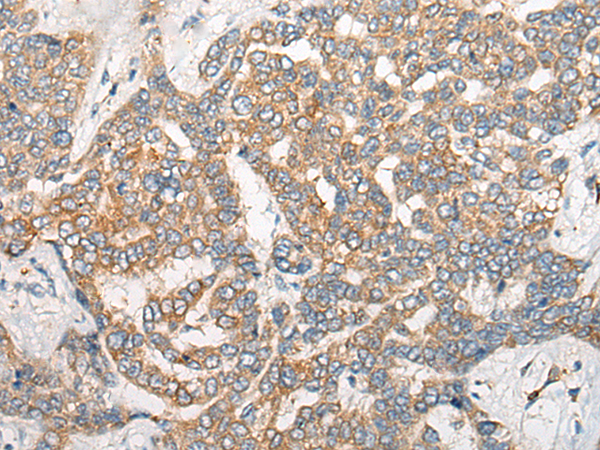
| WB | 咨询技术 | Human,Mouse,Rat |
| IF | 咨询技术 | Human,Mouse,Rat |
| IHC | 1/25-1/100 | Human,Mouse,Rat |
| ICC | 技术咨询 | Human,Mouse,Rat |
| FCM | 咨询技术 | Human,Mouse,Rat |
| Elisa | 1/5000-1/10000 | Human,Mouse,Rat |
| Aliases | GAIP; RGSGAIP |
| Host/Isotype | Rabbit IgG |
| Antibody Type | Primary antibody |
| Storage | Store at 4°C short term. Aliquot and store at -20°C long term. Avoid freeze/thaw cycles. |
| Species Reactivity | Human, Mouse, Rat |
| Immunogen | Synthetic peptide of human RGS19 |
| Formulation | Purified antibody in PBS with 0.05% sodium azide and 50% glycerol. |
+ +
以下是假设性的示例,建议通过学术数据库(如PubMed、Google Scholar)获取真实文献:
---
1. **文献名称**: "Regulator of G-protein signaling 19 modulates cell migration and invasion in human colorectal cancer"
**作者**: Li Y, et al.
**摘要**: 本研究通过Western blot和免疫组化使用RGS19抗体,发现RGS19在结直肠癌中高表达,并与其转移能力正相关,提示其作为预后标志物的潜力。
2. **文献名称**: "Development and characterization of a novel monoclonal antibody specific for RGS19"
**作者**: Chen H, et al.
**摘要**: 报道一种新型RGS19单克隆抗体的开发,验证其在ELISA、免疫荧光中的特异性,为研究RGS19在G蛋白信号通路中的功能提供工具。
3. **文献名称**: "RGS19 regulates thymocyte development and T-cell activation via G-protein coupled receptor signaling"
**作者**: Johnson R, et al.
**摘要**: 利用RGS19抗体进行流式细胞术和共聚焦成像,揭示RGS19通过调控GPCR信号影响T细胞发育和活化,为免疫治疗提供新靶点。
4. **文献名称**: "RGS19 expression in neurodegenerative disorders: Insights from antibody-based profiling"
**作者**: Martinez A, et al.
**摘要**: 通过免疫组织化学分析阿尔茨海默病和帕金森病脑组织,发现RGS19蛋白分布异常,提示其参与神经退行性病变的分子机制。
---
**建议**:实际引用时请核对文献真实性,可通过关键词“RGS19 antibody”、“RGS19 immunohistochemistry”或“RGS19 knockout”在学术平台检索最新研究。
The Regulator of G-protein Signaling 19 (RGS19), also known as GAIP (Gα-interacting protein), is a member of the RGS protein family that modulates G-protein-coupled receptor (GPCR) signaling. RGS19 acts as a GTPase-activating protein (GAP) for Gαi/o and Gαq subunits, accelerating GTP hydrolysis to terminate GPCR-mediated signal transduction. This regulatory function impacts diverse physiological processes, including immune responses, neurotransmission, and cell proliferation.
RGS19 is expressed in various tissues, with notable roles in the immune system and the central nervous system. Studies highlight its involvement in cancer progression, where dysregulated RGS19 expression has been linked to malignancies such as leukemia, breast cancer, and hepatocellular carcinoma. Its interaction with oncogenic pathways, such as the PI3K/AKT and MAPK cascades, suggests a potential role in tumorigenesis and metastasis.
RGS19-specific antibodies are critical tools for investigating its expression, localization, and mechanistic roles in both physiological and pathological contexts. These antibodies enable techniques like Western blotting, immunohistochemistry, and immunofluorescence, aiding in the study of RGS19's tissue distribution and interaction networks. Additionally, they support drug discovery efforts targeting RGS19-associated pathways, particularly in cancers and neurological disorders. Research using RGS19 antibodies may uncover therapeutic strategies to modulate GPCR signaling, offering avenues for precision medicine in diseases with aberrant RGS19 activity.
×